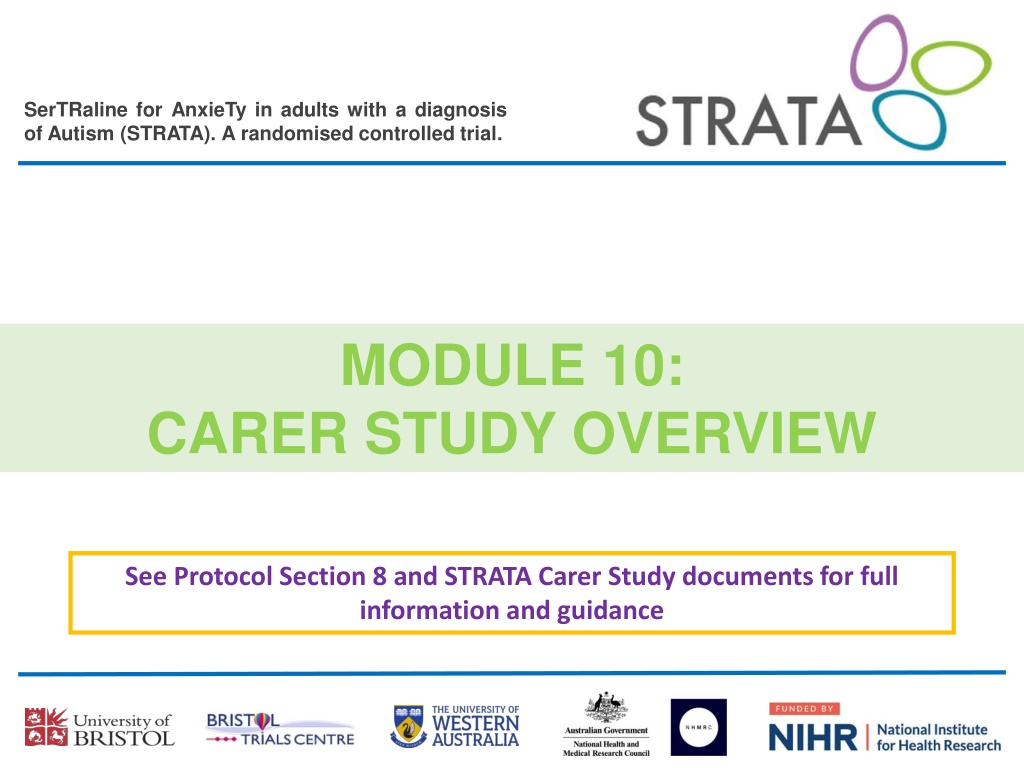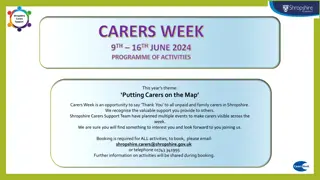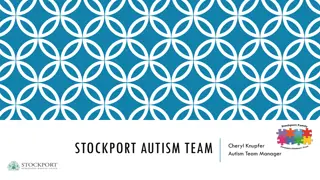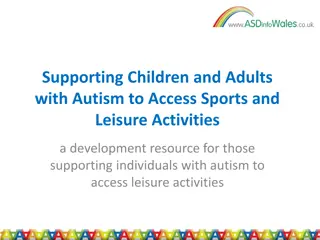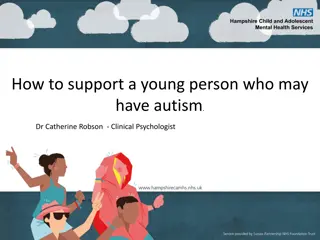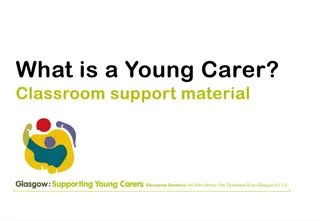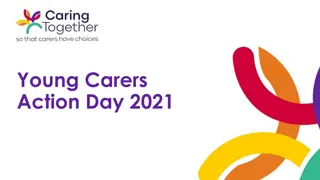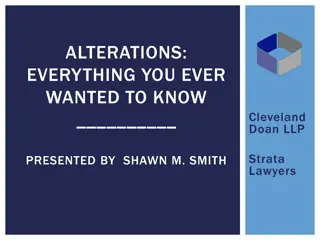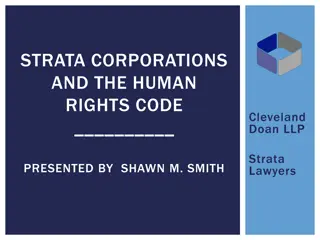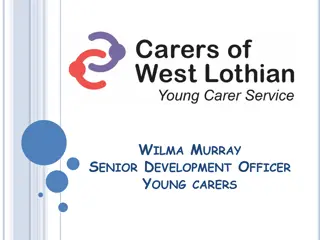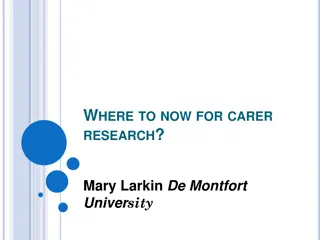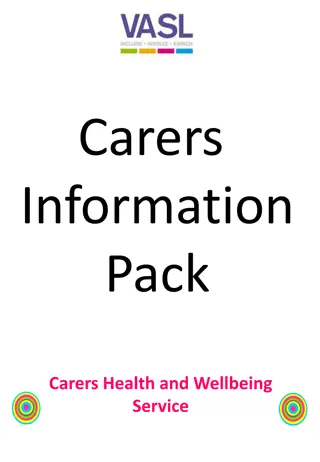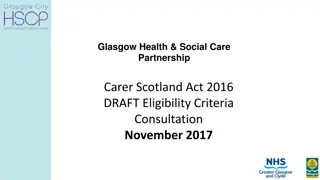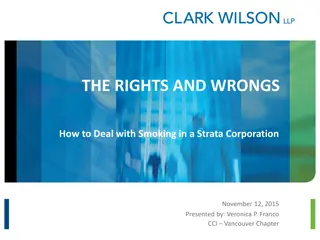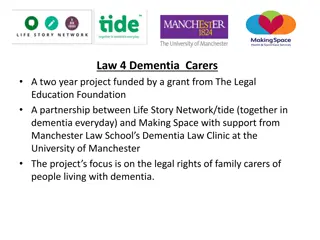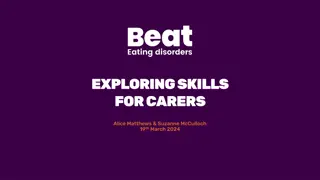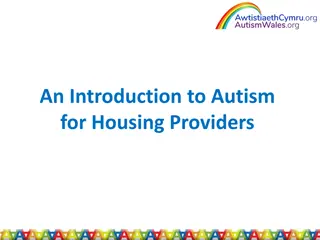Understanding the Impact of Sertraline Treatment on Autism Carers: STRATA Carer Study Overview
This module provides an overview of the STRATA Carer Study, which aims to explore how treating anxiety in adults with autism influences the burden on their carers. The nested study runs parallel to the main STRATA trial and involves assessing carer burden over a 52-week treatment period with sertraline compared to a placebo. Carers will complete questionnaires at specific intervals to evaluate their caregiving responsibilities, well-being, and support received. Identification of carers is done during the baseline appointment, with the participant defining who their carer is. The study aims to gather insights into the well-being of carers of autistic adults undergoing anxiety treatment.
Download Presentation

Please find below an Image/Link to download the presentation.
The content on the website is provided AS IS for your information and personal use only. It may not be sold, licensed, or shared on other websites without obtaining consent from the author. Download presentation by click this link. If you encounter any issues during the download, it is possible that the publisher has removed the file from their server.
E N D
Presentation Transcript
SerTRaline for AnxieTy in adults with a diagnosis of Autism (STRATA). A randomised controlled trial. MODULE 10: CARER STUDY OVERVIEW See Protocol Section 8 and STRATA Carer Study documents for full information and guidance
Content Content This training module covers key information about the STRATA Carer Study. This includes: 1. Aim and objective 2. Identification of carers and invitation to participate 3. Enrolment 4. Follow up 5. Withdrawals 6. Adverse events These icons are used throughout this module: Relevant study documents available in the site file Relevant sections of the study database
Aim & objective Aim & objective Anxiety in adults with a diagnosis of autism, and its treatment, may also impact upon the wellbeing of the people who care for them. Therefore AIM: to explore how the treatment of anxiety for adults with a diagnosis of autism influences the burden to their carer(s). The STRATA Carer Study This nested (separate) study will run parallel to the main STRATA trial following the randomisation (enrolment) of trial participants. OBJECTIVE: To determine the effect of up to 52-weeks of treatment with sertraline versus placebo on carer burden. In simple terms, if a carer takes part in this nested study, they will be helping us to understand whether treatment for anxiety in autistic adults influences the wellbeing and perceived burden of their carers.
Summary of what is involved Summary of what is involved Carers will be asked to complete a brief questionnaire three times; (1) when the person they care for starts taking part in STRATA (week 0); (2) at 16 weeks; and (3) at 52 weeks (end of involvement in the STRATA Carer Study) The questionnaires will ask about their care giving responsibilities, wellbeing, and any support they receive, as well as some questions about the person they care for. Each questionnaire may take around 15 20 minutes to complete.
Carer Carer Study Study Flow Flow
Identification of carers Identification of carers WHEN: during the Baseline (first study) appointment, the (main trial) participant will confirm if they have a carer, or not. CARER DEFINITION:It is up to the STRATA participant to define who their carer is; where possible, it would be one person who knows them well and is likely to continue caring for them over the 52-week trial period. Consider discussing the definition of carer with the person in more broad terms. For example, you can suggest that although they may not consider themselves to have a carer, a person who knows them well (e.g. a family member) and helps them with some tasks or responsibilities could be considered as a carer for the purposes of the study The carer will be approached only with the agreement of the participant and will be asked to provide separate consent to take part in this nested study. ! IMPORTANT ! The participant is still able to participate in the trial if their carer does not wish to participate in the Carer Study, or if there is no carer. Similarly, the carer can continue involvement if the participant withdraws from the main trial.
Invitation to take part Invitation to take part* * *ONLY IF THE PARTICIPANT IDENTIFIES A CARER & AGREES FOR THEM TO BE APPROACHED. Following the Baseline Appointment, the researcher should: (1) Provide the participant with the STRATA Carer Study Information Pack and ask them to forward the pack to their carer at earliest opportunity. This pack contains; Carer Invitation Letter Carer Participant Information Leaflet Carer Consent Form (x2 copies; one for carer s records and one to return to the local team) Carer Baseline Questionnaire and Freepost envelope (online responses preferred) Note that the freepost envelope should be addressed to the local RA (2) During early Safety Check Follow Up (e.g. 1-2 weeks), check if the participant has provided the information pack to their carer. IF NOT, then ask them to do so again. However, no further reminders should be made hereafter.
Enrolment (Baseline, Week 0) Enrolment (Baseline, Week 0) Carers are asked to complete and return the following two paper documents using the pre-paid envelope that is also provided in the invitation pack: (1) Carer Consent Form (2) Baseline Carer Questionnaire NB: The return of a completed and signed consent form demonstrates explicit consent to take part in the STRATA Carer Study. All carers who agree to take part will be allocated a study specific Carer I.D number, which is the same as the participant study I.D. number. Ensure the ID is written on the consent form and questionnaire. Three copies of the completed Carer Consent Form are required; a copy 1) must be filed in the ISF together with a copy of the PIL in recruitment order*; 2) should be given to the carer* (electronically, or via post with the next questionnaire); and 3) should be given to the STRATA central research team. *If a paper (wet ink) form is completed, the original form should be filed in the ISF. If an eConsent form is completed, a completed copy is emailed to the participant once processed, and additional copies can be obtained via the eConsent (database) system.
Enrolment (Baseline, Week 0) Enrolment (Baseline, Week 0) STRATA Clinical Database Project C050 Participant Pathway. Carer Consent Forms returned on paper should be entered into the All Carer Consents instrument [See Module 5: Consent User Guide]. Carer Baseline Questionnaires returned on paper should be entered into the Carer Quest instrument.
Alternative methods of completion Alternative methods of completion Alternatively, if they would prefer to complete the consent form and/or questionnaire online, or via telephone/video call, they can contact you (the local STRATA team) to arrange this. 1. Follow the steps for taking eConsent from the carer set-out in Module 5: Consent User Guide. 2. Initiate the database to send the Carer Baseline Questionnaire online by entering the carer s email address into the carerinvite instrument on the STRATA Admin database project A040 (Participants) [See next slide]. As the carer for their email address if they contact you. An email containing a link to complete the questionnaire will be automatically sent to the carer by the database.
Alternative methods of completion Alternative methods of completion STRATA Admin Project A040 - Carer Invite 1. The participant will have identified someone as their carer at the baseline appointment (see Module 4: Baseline Appointment Part 1) 2. Enter the completion method for the baseline questionnaire as Online Survey (encouraged) 3. Enter the carer s email address if you are given it by the carer 4. Save the form as complete and exit the form 5. An email containing a link to complete the questionnaire will be sent to the email address provided.
Carer follow up questionnaires Carer follow up questionnaires You (local research team) should send a Carer Questionnaire at 16- and 52- weeks post-randomisation (of the STRATA participant). N.B. If the carer specifies online questionnaires then these will be sent automatically by the database. Questionnaires can be completed via various alternative methods (e.g. online, telephone/video conferencing, or post) to minimise loss to follow up. If no response from a carer within reasonable time of sending (e.g. after ~3 weeks), then you should try calling them, and/or resend another online link/pack with a reminder letter (or email equivalent). For each questionnaire, you can make up to three contact attempts (initial sending, plus two reminders). If no response is received after the third attempt, the relevant questionnaire will be marked as missing. You should, however, continue to send the next questionnaire as planned, unless the participant requests/confirms that they no longer want to complete them.
Carer Withdrawal Carer Withdrawal Carers will remain in the Carer Study unless: They choose to withdraw, or If they are unable to continue for clinical reasons, as notified by the participant. The carer does not need to withdraw from this sub-study if the STRATA trial participant (i.e. the person for whom they are a carer) withdraws from the main trial. If a carer withdraws consent, data collected up to the point of withdrawal will be retained (confidentially) for analysis, as stated in the carer participant information leaflet. Follow the procedures set out in Module 11: Change of Permissions/Withdrawal, to withdraw a carer from the study.
Adverse Events (AEs) Adverse Events (AEs) This Carer Study is low risk We do not expect, nor will actively seek, any AEs related to research procedures, such as completing a questionnaire. If, however, we become aware of relevant information about a carer regarding an AE related to taking part the Carer Study, you should ensure that it is recorded. Follow the procedures and requirements set out in Module 9: Pharmacovigilance (Safety Reporting), to record AEs.
Confirmation of training Confirmation of training When you have completed this training module, please let the STRATA Central Trial Team (UK) know by completing an online form. See: https://forms.office.com/r/vraB5ttrnc Your form should be saved and retained in your Investigator Site File.
Acknowledgements Acknowledgements Sponsor: Chief Investigator: Co-investigators: UK: University of Bristol (UoB). Dr Dheeraj Rai, Consultant Senior Lecturer in Psychiatry. Dheeraj.Rai@bristol.ac.uk Professor David Kessler, Professor of Primary Care, University of Bristol Professor Nicola Wiles, Professor of Epidemiology, University of Bristol Dr Stephanie J MacNeill, Lecturer in Medical Statistics, University of Bristol Dr Nicola Mills, Senior Research Fellow in Health Services Research, University of Bristol Dr Joanna Thorn, Research Fellow in Health Economics, University of Bristol Dr Ailsa Russell, Reader and Clinical Psychologist, University of Bath Mr Jack Welch, Autistic advocate and Discover insight group member/contributor Professor Traolach Brugha, Professor of Psychiatry, University of Leicester Professor David Baldwin, Professor of Psychiatry, University of Southampton Professor Peter Langdon, Professor of Clinical and Forensic Psychology, University of Warwick Dr Regi Alexander, Consultant Psychiatrist, Hertfordshire Partnership University NHS Foundation Trust Dr Raja Mukherjee, Consultant Psychiatrist, Surrey and Borders Partnership NHS Foundation Trust Associate Professor Helen Leonard, NHMRC Senior Research Fellow and Assoc Prof, University of Western Australia Dr Emma Glasson, Senior Research Fellow/Study Coordinator, University of Western Australia Professor Sergio Starkstein, Professor of Psychiatry, University of Western Australia Australia: The University of Western Australia (UWA) Trial Manager(s): Mr Doug Webb and Dr Amanda Lewis, Bristol Medical School, University of Bristol, UK. strata-rct@bristol.ac.uk Senior Research Associate: Dr Jade Eloise Norris, Bristol Medical School, University of Bristol, UK Senior Research Officer: Ms Katherine Hatch, Freemantle Hospital, University of Western Australia Study Management: This study was designed and delivered in collaboration with the Bristol Randomised Trials Collaboration (BRTC), a UKCRC registered clinical trials unit (CTU) which, as part of the Bristol Trials Centre (BTC), is in receipt of National Institute for Health Research CTU support funding. Funding Acknowledgement and Disclaimer: This study is funded by the National Institute for Health Research (NIHR) HTA Programme (Ref: 127337). The views expressed are those of the author(s) and not necessarily those of the NIHR or the Department of Health and Social Care. The authors and University of Western Australia acknowledge funding from the National Health and Medical Research Council (Project Grant 1171206). The contents of the published material/website are solely the responsibility of the authors and do not reflect the views of NHMRC. REDCap: Study data are collected and managed using REDCap (Research Electronic Data Capture, Harris PA, et al. J Biomed Inform. 2009 Apr;42(2):377- 81) hosted at the University of Bristol.
